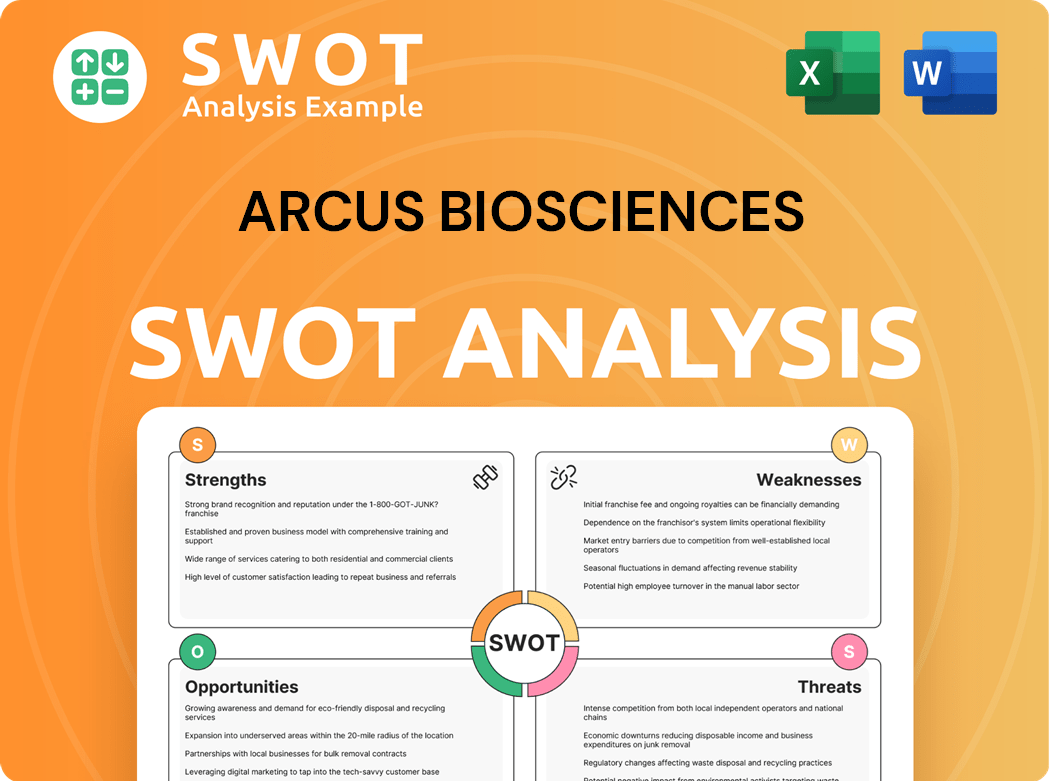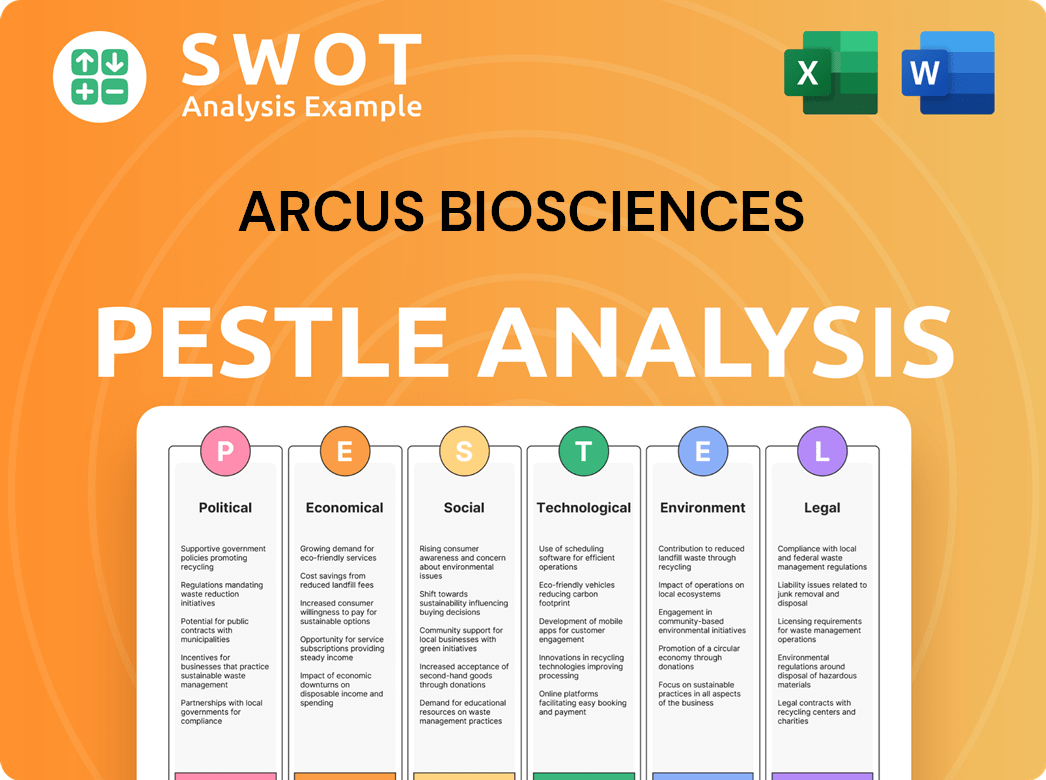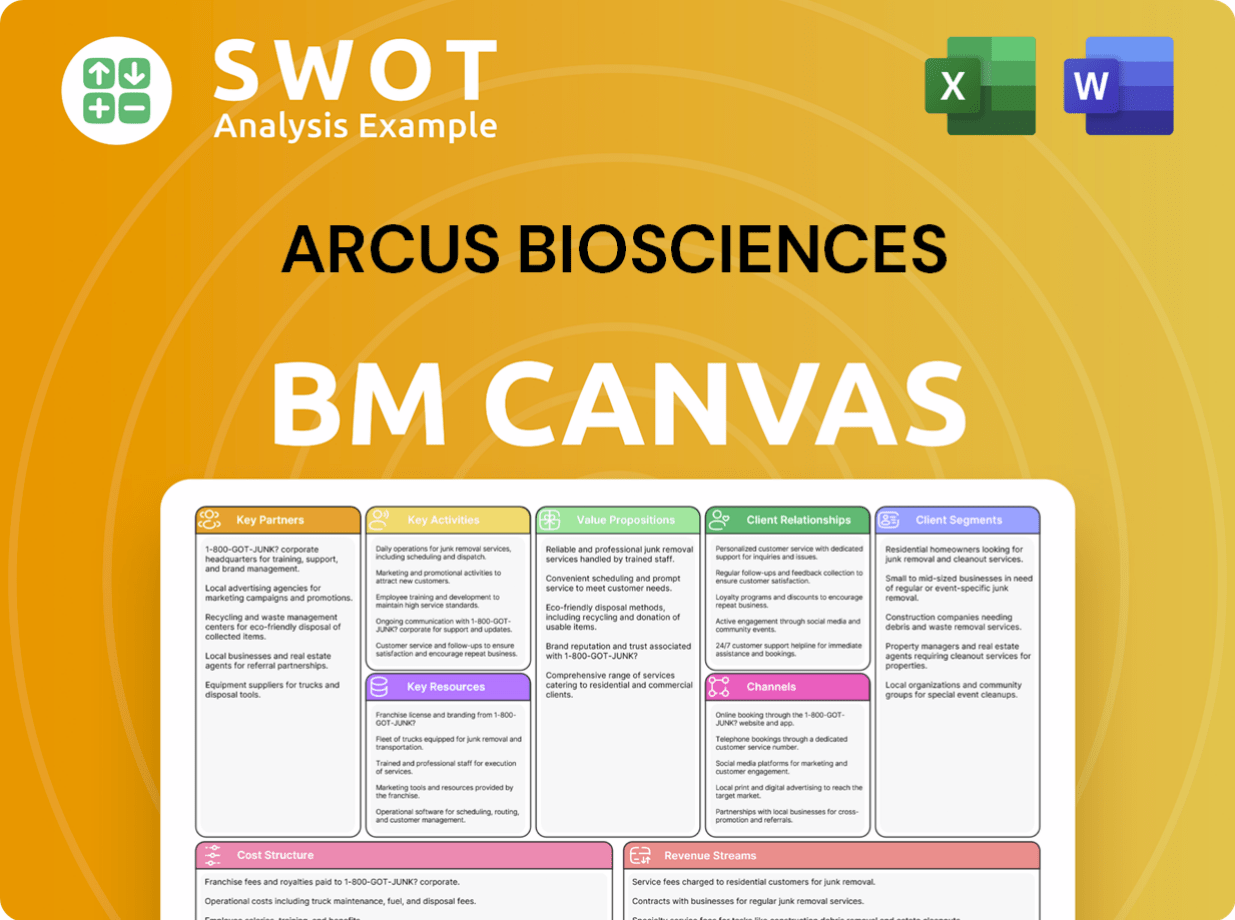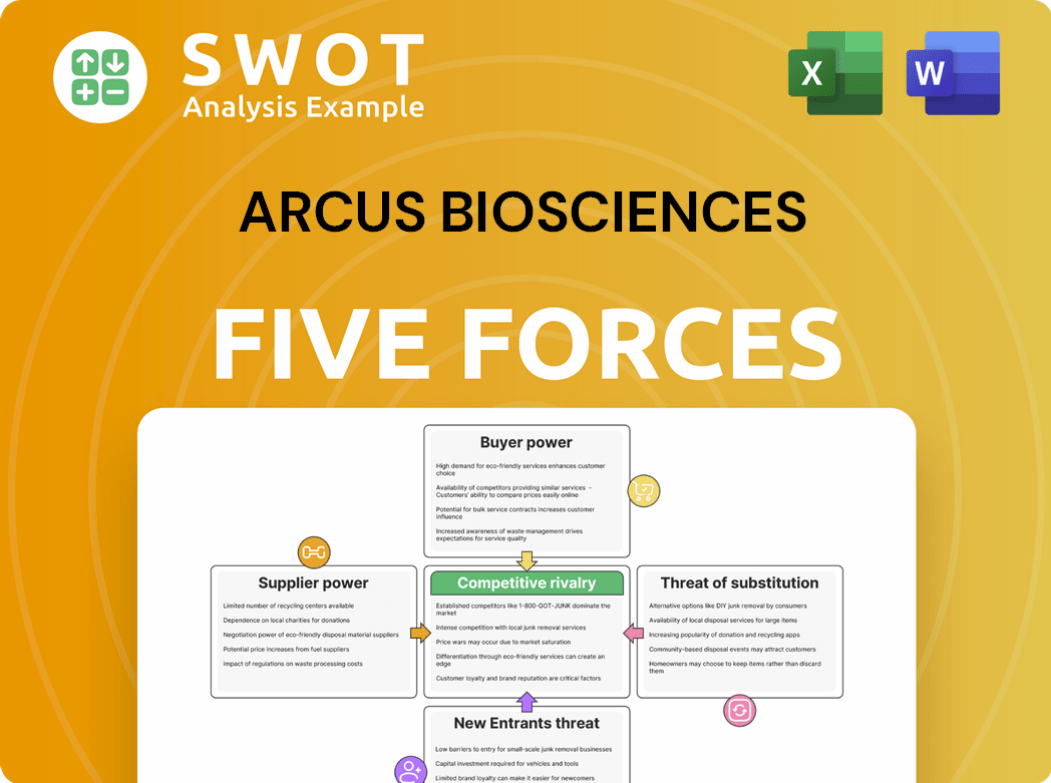Arcus Biosciences Bundle
How is Arcus Biosciences Revolutionizing Cancer Treatment?
Arcus Biosciences is making waves in the oncology world, but how does it plan to get its groundbreaking therapies to patients? This deep dive explores the Arcus Biosciences SWOT Analysis, dissecting its sales and marketing strategies to understand its approach to the competitive biopharmaceutical landscape. We'll uncover the tactics behind its innovative cancer treatments and its strategic partnerships.

Understanding Arcus Biosciences' sales and marketing approach is critical for investors and industry watchers alike. From its early-stage focus to its current late-stage oncology status, the company's evolution reflects a dynamic business model. This analysis will delve into Arcus Biosciences' pipeline, its partnerships and collaborations, and its commercialization strategy, providing insights into its potential market share analysis and future outlook within the oncology sector.
How Does Arcus Biosciences Reach Its Customers?
For a clinical-stage biopharmaceutical company like Arcus Biosciences, the term 'sales channels' takes on a unique meaning. Their approach to the Revenue Streams & Business Model of Arcus Biosciences centers on strategic alliances and collaborations rather than direct sales. This strategy is typical for companies in the drug development phase, where the focus is on advancing promising therapies through clinical trials and regulatory processes.
The primary sales channel for Arcus Biosciences involves partnering with larger pharmaceutical companies. These partners possess the necessary infrastructure for late-stage clinical trials, regulatory approvals, and, ultimately, commercialization. This model allows Arcus to leverage the resources and expertise of established players in the pharmaceutical industry, accelerating the development and potential market reach of its investigational therapies.
A key example of this strategy is the ongoing collaboration with Gilead Sciences, initiated in May 2020. This partnership grants Gilead exclusive option rights to Arcus's clinical programs. This enables the co-development of several investigational products, including zimberelimab, domvanalimab, etrumadenant, and quemliclustat. These collaborations are essential for Arcus Biosciences' sales strategy and market share.
Arcus Biosciences focuses on strategic partnerships as its primary sales channel. These collaborations are crucial for advancing its drug development pipeline and expanding its market reach. The partnerships provide access to resources, expertise, and wider geographical markets, supporting the company's growth.
Arcus Biosciences has also adopted a strategy of regional partnerships for specific pipeline assets. For example, Taiho Pharmaceutical exercised its option for quemliclustat in Japan and parts of Asia in July 2024. This approach allows Arcus to tap into regional expertise and resources.
Co-development agreements, such as the one with Gilead Sciences, are a core component of Arcus's sales and marketing approach. These collaborations enable the co-development of multiple investigational products. These agreements provide Arcus with significant financial and strategic benefits.
Arcus Biosciences' strong financial position supports its ongoing development programs and strategic collaborations. As of March 31, 2025, the company reported approximately $1.0 billion in cash, cash equivalents, and marketable securities. This financial stability is critical for advancing its pipeline.
The partnership with AstraZeneca, initiated in 2020, represents another critical collaboration. In October 2024, they began evaluating casdatifan in combination with volrustomig for ccRCC, with AstraZeneca sponsoring and operationalizing the trial. These partnerships are essential for Arcus Biosciences' future outlook.
- Gilead Sciences: Co-development and commercialization of multiple therapies.
- Taiho Pharmaceutical: Regional partnership for quemliclustat in Japan and parts of Asia.
- AstraZeneca: Collaboration on clinical trials and drug development.
- These collaborations enable access to broader markets and shared resources.
Arcus Biosciences SWOT Analysis
- Complete SWOT Breakdown
- Fully Customizable
- Editable in Excel & Word
- Professional Formatting
- Investor-Ready Format

What Marketing Tactics Does Arcus Biosciences Use?
The marketing tactics of Arcus Biosciences, a clinical-stage biopharmaceutical company, are carefully crafted to engage scientific, medical, and investment communities. Their approach prioritizes digital strategies and strategic partnerships to communicate clinical trial updates and pipeline advancements. This is a key component of their Arcus Biosciences sales and marketing approach.
Arcus Biosciences's marketing strategy heavily emphasizes data-driven communication and engagement with key opinion leaders (KOLs) to build confidence in its drug candidates. The company uses a multi-faceted approach, including digital content, investor relations, and participation in medical conferences, to reach its target audience effectively. This is a core element of the Arcus Biosciences business model.
The company's focus is on providing transparent and consistent updates on clinical trial outcomes. This strategy helps maintain investor confidence and supports the company's long-term goals within the competitive landscape of the oncology market. For more insights, check out the Brief History of Arcus Biosciences.
Arcus Biosciences leverages digital marketing through its website, content marketing, and email campaigns. The website acts as a central hub for scientific publications, investor presentations, and press releases. Email marketing keeps stakeholders informed of significant developments.
Content marketing is crucial, with detailed scientific publications and investor presentations. These materials highlight advancements in the Arcus Biosciences pipeline and clinical trial data. The company regularly updates its 'Investors & Media' section with financial results and pipeline updates.
While less direct, SEO and paid advertising support the company's online presence for relevant scientific and financial searches. This ensures that clinical trial results and corporate news are easily discoverable by stakeholders. This approach supports Arcus Biosciences's investor relations.
Influencer partnerships involve collaborations with key opinion leaders (KOLs) and leading researchers. These KOLs present Arcus's data at major medical conferences. For example, Dr. Toni Choueiri from Dana-Farber Cancer Institute presented data from the ARC-20 study in 2024.
Social media is used for corporate communications and industry engagement. Traditional media includes press releases distributed via business wire services. These channels are used to disseminate information about Arcus Biosciences's drug development strategy.
Medical and investor conferences are essential for presenting data and engaging with potential partners and investors. Examples include the Barclays 27th Annual Global Healthcare Conference and the Leerink Global Healthcare Conference 2025. These events support the Arcus Biosciences sales strategy.
Arcus Biosciences's marketing approach is data-driven, with detailed reporting of clinical trial outcomes, such as objective response rates (ORR) and progression-free survival (PFS). Customer segmentation focuses on oncologists, researchers, and institutional investors. Personalization is achieved through targeted presentations and discussions tailored to their specific interests. This supports the company's commercialization strategy.
- Key Metrics: The focus is on providing detailed clinical trial data to build confidence in its pipeline.
- Target Audience: The primary target includes oncologists, researchers, and institutional investors.
- Partnerships: Strategic collaborations are a key component of the marketing mix, enhancing the Arcus Biosciences partnerships and collaborations.
- Innovation: Consistent and transparent release of clinical data is a notable innovation, building trust and confidence.
Arcus Biosciences PESTLE Analysis
- Covers All 6 PESTLE Categories
- No Research Needed – Save Hours of Work
- Built by Experts, Trusted by Consultants
- Instant Download, Ready to Use
- 100% Editable, Fully Customizable

How Is Arcus Biosciences Positioned in the Market?
Arcus Biosciences strategically positions itself as a clinical-stage biopharmaceutical company. Their brand centers on developing 'differentiated molecules and combination therapies for people with cancer,' focusing on innovative science and a patient-centric approach. This approach is a core element of their Arcus Biosciences sales strategy.
The company emphasizes its commitment to 'underexploited biological opportunities' and creating 'first- or best-in-class medicines.' This commitment to innovation is a key differentiator in the competitive oncology sector. Their communications are authoritative and forward-looking, underscoring their expertise and ambitious goals in transforming cancer treatment. This is a crucial part of their Arcus Biosciences marketing strategy.
Arcus Biosciences appeals to oncologists, researchers, and investors by developing novel immunotherapies and targeted treatments. For example, their HIF-2alpha inhibitor, casdatifan, is being positioned as a potential best-in-class treatment for clear cell renal cell carcinoma. This focus is central to their Arcus Biosciences business model.
The core message revolves around 'the pursuit of cures for cancer' through innovative science and a patient-centric approach.
The company projects a professional and science-driven image through its corporate presentations and website, using clear data and a focus on scientific leadership.
Communications are authoritative, confident, and forward-looking, underscoring expertise and ambitious goals in transforming cancer treatment.
The primary target audience includes oncologists, researchers, and investors, reached through novel immunotherapies and targeted treatments.
Brand consistency is maintained across investor relations, scientific presentations, and corporate communications. Arcus Biosciences responds to shifts in consumer sentiment or competitive threats by highlighting positive clinical data and strategic partnerships. As of May 2025, the company has a strong positive perception within the financial community, with 11 buy ratings and no sell ratings, and an average target price implying a potential upside of 196.34%. This reflects positively on their Arcus Biosciences investor relations.
Arcus Biosciences Business Model Canvas
- Complete 9-Block Business Model Canvas
- Effortlessly Communicate Your Business Strategy
- Investor-Ready BMC Format
- 100% Editable and Customizable
- Clear and Structured Layout

What Are Arcus Biosciences’s Most Notable Campaigns?
For a clinical-stage biopharmaceutical company like Arcus Biosciences, the Arcus Biosciences sales strategy and Arcus Biosciences marketing strategy are intrinsically linked to their clinical trial advancements, data presentations at major medical conferences, and strategic collaborations. These activities are designed to build scientific validation, attract investment, and signal future commercial potential, which is a core element of their Arcus Biosciences business model.
The company's approach focuses on generating and disseminating compelling clinical data to key stakeholders, including investors, potential partners, and the medical community. This data-driven strategy is crucial for advancing their pipeline and securing partnerships, which are vital for success in the competitive oncology market. Understanding the Arcus Biosciences pipeline is key to grasping their overall strategy.
The success of Arcus Biosciences hinges on effectively communicating its scientific advancements and strategic partnerships. The company leverages various channels, including major medical conferences, investor calls, and press releases, to disseminate critical information and build credibility. This comprehensive approach supports their Arcus Biosciences sales and marketing approach.
The development and presentation of data for casdatifan, their HIF-2alpha inhibitor for clear cell renal cell carcinoma (ccRCC), is a key campaign. The objective is to demonstrate casdatifan's potential as a best-in-class HIF-2alpha inhibitor. This involves showcasing superior efficacy and safety compared to existing treatments. Data from the Phase 1/1b ARC-20 study showed promising results, bolstering confidence in casdatifan's potential.
Significant campaigns involve strategic collaborations with Gilead Sciences and AstraZeneca. These partnerships aim to leverage external expertise and resources to accelerate drug development and expand market reach. Press releases, investor presentations, and financial reports are the main channels used to communicate these partnerships. These collaborations are crucial for advancing programs like domvanalimab, quemliclustat, and etrumadenant.
The casdatifan campaign focuses on presenting robust clinical data to demonstrate its potential in treating ccRCC. The goal is to highlight its efficacy and safety profile to attract investors and partners. Data from the ARC-20 study has been critical in showcasing the drug's potential.
- The 2024 EORTC-NCI-AACR Symposium and the upcoming 2025 ASCO Annual Meeting are key platforms for data dissemination.
- The Phase 1/1b ARC-20 study showed a median PFS of 9.7 months for the 50mg twice-daily monotherapy cohort.
- For the 100mg daily cohort, a 34% objective response rate was observed in heavily pretreated patients with ccRCC.
- The company is also focused on communicating with key opinion leaders.
The Gilead collaboration, established in May 2020, has been a major source of revenue for Arcus. In Q1 2024, Arcus recognized $135 million in license and development services revenue. In Q1 2025, Arcus recognized $20 million in license and development services revenue and $8 million in other collaboration revenue from Gilead.
The collaboration with AstraZeneca, announced in October 2024 for casdatifan in ccRCC, further validates Arcus's pipeline. This partnership provides additional development capabilities. This collaboration helps to advance novel therapies for cancer.
Robust clinical data is essential for driving interest and partnerships. Strategic collaborations are crucial for de-risking and accelerating development. Understanding the competitive landscape is critical for success in the biopharmaceutical industry.
The Arcus Biosciences revenue model is heavily influenced by its collaborations. The company generates revenue through license agreements, development services, and potential future product sales. The Gilead collaboration is a significant revenue driver.
Investor relations play a crucial role in communicating clinical trial updates and partnership details. Regular investor calls and presentations keep shareholders informed. Effective communication is vital for maintaining investor confidence.
The Arcus Biosciences future outlook is tied to the success of its clinical trials and partnerships. The company's ability to generate positive clinical data and secure further collaborations will be key. The Arcus Biosciences oncology focus presents both opportunities and challenges.
For more insights, you can explore the Target Market of Arcus Biosciences.
Arcus Biosciences Porter's Five Forces Analysis
- Covers All 5 Competitive Forces in Detail
- Structured for Consultants, Students, and Founders
- 100% Editable in Microsoft Word & Excel
- Instant Digital Download – Use Immediately
- Compatible with Mac & PC – Fully Unlocked

Related Blogs
- What are Mission Vision & Core Values of Arcus Biosciences Company?
- What is Competitive Landscape of Arcus Biosciences Company?
- What is Growth Strategy and Future Prospects of Arcus Biosciences Company?
- How Does Arcus Biosciences Company Work?
- What is Brief History of Arcus Biosciences Company?
- Who Owns Arcus Biosciences Company?
- What is Customer Demographics and Target Market of Arcus Biosciences Company?
Disclaimer
All information, articles, and product details provided on this website are for general informational and educational purposes only. We do not claim any ownership over, nor do we intend to infringe upon, any trademarks, copyrights, logos, brand names, or other intellectual property mentioned or depicted on this site. Such intellectual property remains the property of its respective owners, and any references here are made solely for identification or informational purposes, without implying any affiliation, endorsement, or partnership.
We make no representations or warranties, express or implied, regarding the accuracy, completeness, or suitability of any content or products presented. Nothing on this website should be construed as legal, tax, investment, financial, medical, or other professional advice. In addition, no part of this site—including articles or product references—constitutes a solicitation, recommendation, endorsement, advertisement, or offer to buy or sell any securities, franchises, or other financial instruments, particularly in jurisdictions where such activity would be unlawful.
All content is of a general nature and may not address the specific circumstances of any individual or entity. It is not a substitute for professional advice or services. Any actions you take based on the information provided here are strictly at your own risk. You accept full responsibility for any decisions or outcomes arising from your use of this website and agree to release us from any liability in connection with your use of, or reliance upon, the content or products found herein.